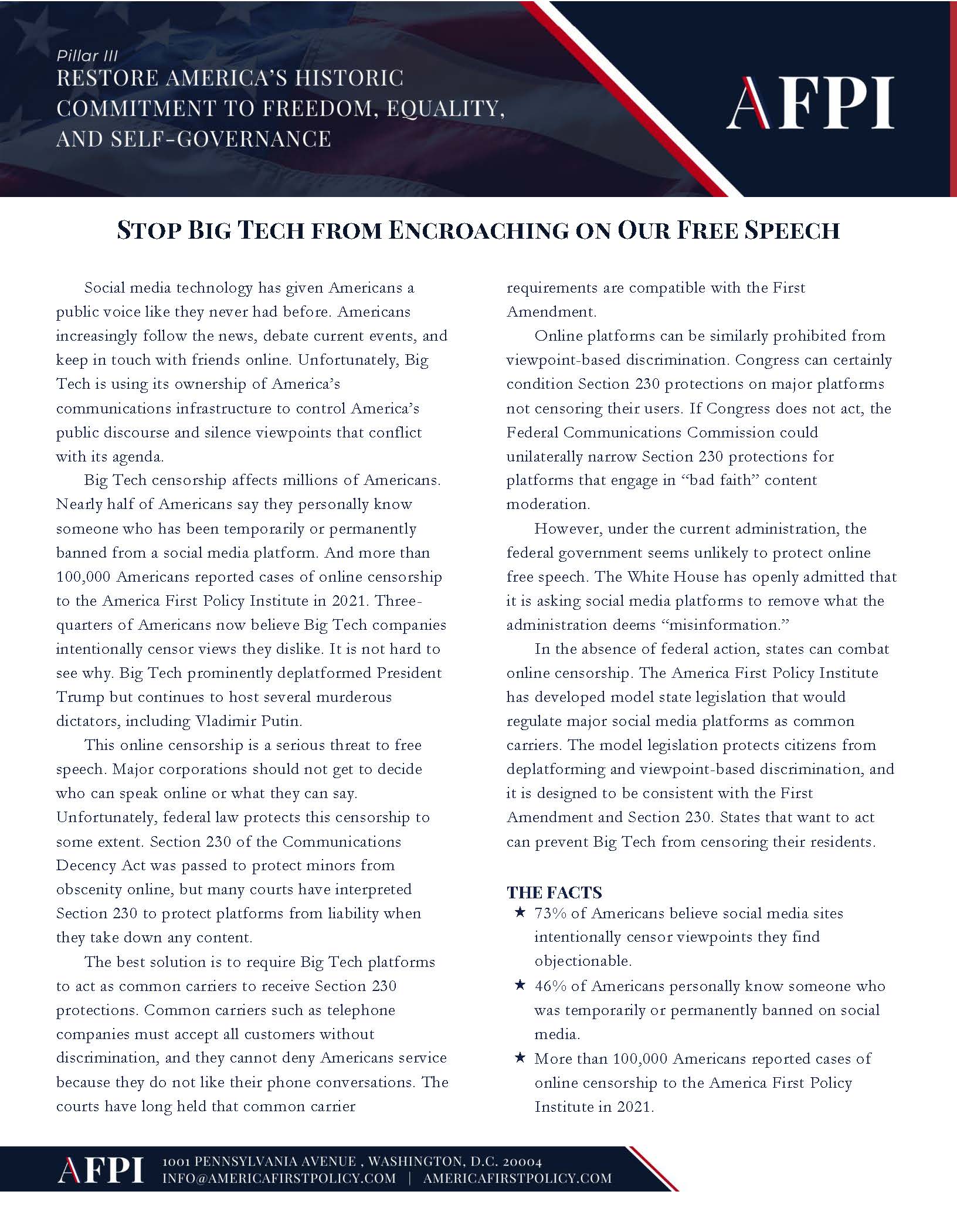Pillar III: Restore America's Historic Commitment to Freedom, Equality, and Self-Governance
Stop Big Tech from Encroaching on Our Free Speech
Social media technology has given Americans a public voice like they never had before. Americans increasingly follow the news, debate current events, and keep in touch with friends online. Unfortunately, Big Tech is using its ownership of America’s communications infrastructure to control America’s public discourse and silence viewpoints that conflict with its agenda.
Big Tech censorship affects millions of Americans. Nearly half of Americans say they personally know someone who has been temporarily or permanently banned from a social media platform. And more than 100,000 Americans reported cases of online censorship to the America First Policy Institute in 2021. Three-quarters of Americans now believe Big Tech companies intentionally censor views they dislike. It is not hard to see why. Big Tech prominently deplatformed President Trump but continues to host several murderous dictators, including Vladimir Putin.
This online censorship is a serious threat to free speech. Major corporations should not get to decide who can speak online or what they can say. Unfortunately, federal law protects this censorship to some extent. Section 230 of the Communications Decency Act was passed to protect minors from obscenity online, but many courts have interpreted Section 230 to protect platforms from liability when they take down any content.
The best solution is to require Big Tech platforms to act as common carriers to receive Section 230 protections. Common carriers such as telephone companies must accept all customers without discrimination, and they cannot deny Americans service because they do not like their phone conversations. The courts have long held that common carrier requirements are compatible with the First Amendment.
Online platforms can be similarly prohibited from viewpoint-based discrimination. Congress can certainly condition Section 230 protections on major platforms not censoring their users. If Congress does not act, the Federal Communications Commission could unilaterally narrow Section 230 protections for platforms that engage in “bad faith” content moderation.
However, under the current administration, the federal government seems unlikely to protect online free speech. The White House has openly admitted that it is asking social media platforms to remove what the administration deems “misinformation.”
In the absence of federal action, states can combat online censorship. The America First Policy Institute has developed model state legislation that would regulate major social media platforms as common carriers. The model legislation protects citizens from deplatforming and viewpoint-based discrimination, and it is designed to be consistent with the First Amendment and Section 230. States that want to act can prevent Big Tech from censoring their residents.
THE FACTS
- 73% of Americans believe social media sites intentionally censor viewpoints they find objectionable.
- 46% of Americans personally know someone who was temporarily or permanently banned on social media.
- More than 100,000 Americans reported cases of online censorship to the America First Policy Institute in 2021.
- 65% of Americans believe people should be able to freely express their views on social media, including views that others find offensive.
- The Twitter accounts of Vladimir Putin, Zabihullah Mujahid, the Taliban Spokesman of the Islamic Emirate of Afghanistan, Ayatollah Khamenei of Iran, Bashar al- Assad of Syria, and Venezuelan dictator Nicolas Maduro all remain active, while former President Trump’s account remains banned.
- YouTube’s “Elections Misinformation Policy” prohibits posting “Content that advances false claims that widespread fraud, errors, or glitches changed the outcome of any past U.S. presidential election.”
- However, YouTube has not taken down numerous videos in which Hillary Clinton claims the 2016 election was stolen from her. For example, a YouTube video in which Hillary Clinton says, “Trump knows he’s an illegitimate president,” remains active.
THE AMERICA FIRST AGENDA
At the federal level, support policies that:
- Allow major social media platforms to receive Section 230 legal protections only if they act as common carriers—companies that accept all customers without discrimination.
- Issue regulations from the Federal Communications Commission that narrow Section 230 protections for companies that engage in bad faith content moderation.
At the state level, support policies that:
- Regulate major social media platforms as common carriers.
REFERENCES
29% Believe Social Media Companies Provide Neutral Platform by Scott Rasmussen, ScottRasmussen.com (Aug. 2021).
Free Expression, Harmful Speech and Censorship in a Digital World, Knight Foundation and Gallup (June 2020).
Most Americans Think Social Media Sites Censor Political Viewpoints, by Emily Vogels, Andrew Perrin, and Monica Anderson, Pew Research Center (Aug. 2020).
Preventing Big Tech Censorship: How States Can Defend Free Speech Online by James Sherk, America First Policy Institute (Nov. 2021).
White House ‘flagging’ posts for Facebook to censor over COVID ‘misinformation’ by Steven Nelson, The New York Post (July 2021).
